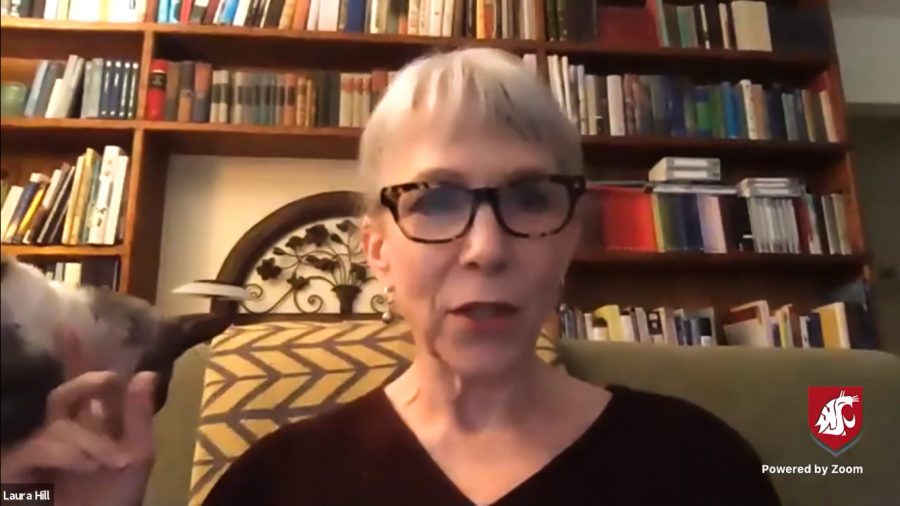WSU officials describe resources available to students, staff, faculty
Work duty modifications available to employees with dependents; modifications include leave, flexible work schedules
When faculty members are granted modifications, they are still fully employed and paid, as usual, said Senior Vice Provost Laura Hill.
January 29, 2021
WSU Office of the Provost added COVID-19 caregiver responsibilities to its list of circumstances that allow faculty members to request modified duties from their work.
When faculty members are granted modifications, they are still fully employed and paid, as usual, Senior Vice Provost Laura Hill said during a COVID-19 Town Hall Wednesday morning.
Modifications for faculty members in charge of dependents because of the pandemic can request up to two academic terms off, she said. Other modifications include implementing co-teaching so faculty members can be partially relieved from teaching duties.
A guide of possible leave options for faculty and staff is available on WSU Human Resource Services’ website, said Kendra Wilkins-Fontenot, labor relations director for HRS. Leave is available for those who are having COVID-19 related difficulties.
As long as someone is in “paid status” and remains a benefit-eligible employee, they will retain their benefits, said Ann Monroe, benefit services director for HRS. More information about employee assistance can be found on HRS’s website.
“We do everything we can to make sure that component is not being impacted for our employees because that’s pretty crucial right now,” Monroe said. “We’ve actually had very few people in the last 10 months who have lost eligibility due to COVID reasons.”
Several faculty and staff members have requested a more flexible working schedule, so they do not have to follow a normal 8 a.m. to 5 p.m. schedule, said Lisa Gehring, assistant vice president of employment services for HRS.
Teleworking is the preferred working option, Gehring said. Telework sometimes requires more equipment than an employee has, so HRS also provides access to technology resources.
HRS will provide training and other resources to faculty and staff when the university begins to transition back to in-person duties, Gehring said.
Childcare is difficult to find right now because of reduced class sizes and services, said Heather Mac Dermott-Harvey, WSU Children’s Center director. Resources are available to employees who need help finding childcare.
It is important right now to teach children how to handle new situations, especially during the pandemic, Mac Dermott-Harvey said.
Children are able to “catch” stress from their caregivers, said Sara Waters, assistant professor of human development for WSU’s College of Agriculture, Human and Natural Resource Sciences.
The most powerful source of resilience children have comes from their caregivers, she said. When that source of resilience is not stable, then it is possible a caregiver’s negative emotions will transmit to the child.
“As much as we want to protect our kids from having to face any adversity, that is not really realistic in our world,” Waters said.
To prevent children from catching caregivers’ stress, caregivers should talk about their feelings with their children in honest and age-appropriate ways instead of saying everything is fine, she said.
“When we support our own resilience we are then better able to support our children’s resilience,” Waters said. “This means that we really need to pay attention to our bodies so that we can identify how we’re really feeling.”
There are resources available for families who need help or want to learn more.
There are academic support resources available to students who have caregiving responsibilities, said Mary Wack, vice provost for academic engagement and student achievement. This includes workshops and peer tutoring, as well as tutoring through the Undergraduate Writing Center and the Math Learning Center.
WSU is looking to maintain and enhance its quality of instruction for students during fall semester whether it be in person or through a hybrid model, said Provost Elizabeth Chilton.
Some classes were and are being held in person on the Pullman campus, following proper safety precautions. No cases of COVID-19 have been spread in the classroom, so similar precautions will be applied to in-person classes in the fall as in-person opportunities expand.
Individuals in town should continue to follow COVID-19 safety measures like washing hands, social distancing and wearing masks even if they are vaccinated, said Ben Stone, public information officer for Whitman County Public Health. The number of vaccines is limited, so following safety measures is still important.
Individuals can find out their vaccination-eligibility status on the Washington State Department of Health’s website.
WSU President Kirk Schulz said students, staff and faculty members should take care of themselves as much as they can by exercising, turning off social media accounts and finding something to do like walking or reading.
The full town hall can be viewed on WSU’s website.
















